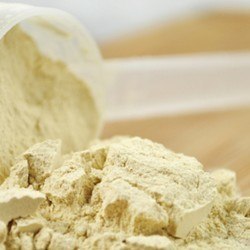
With its growing popularity, there are dozens of different collagen supplements available today. With all these options, it can be a little confusing to pick the best collagen supplement for you.
So in this post we’ll objectively explain the differences between the different collagen supplements available and why some might be better than others (depending on your health goals).
Before we get into which collagen supplements are the best and why it’s important to understand what collagen is so if you haven’t read our article “What Is Collagen” I recommend you do so now.
Different Types of Collagen Supplements
There are essentially three major types of collagen supplements:
- Gelatin collagen supplements
- Hydrolyzed collagen supplements
- Collagen booster supplements
If you don’t know the difference between gelatin and collagen, they are basically two forms of collagen that are broken down to different degrees. Collagen is a very complex molecule, which is what gives it the strength and flexibility it has. “Hydrolysis” is just a way of breaking that chain down. Gelatin is partially hydrolyzed. And “collagen peptides”, as some people call them, are fully hydrolyzed collagen.
Gelatin collagen is a great addition to food. People commonly make “Jell-O” out of it, but they also add it to other recipes as a thickener. Gelatin has some very particular digestive benefits. Some reports show that the probiotics in your gut are supported by gelatin in your diet.
Hydrolyzed collagen, of “collagen peptides”, are a form of collagen where the molecule has been broken down into even smaller particles. These peptides are so small they can actually pass through your intestinal wall and into your bloodstream without further digestion. This is why some people call it “pre-digested collagen”.
The third type of supplement is a collagen boosting supplement, which means is when collagen is combined with other supplements that support collagen protection and creation. Collagen Complete is an example of a supplement that combines hydrolyzed collagen with
Sources of Collagen Supplements
There’s a debate whether the source of collagen used in collagen supplements actually makes a difference. The common sources are:
- Beef hides (bovine collagen)
- Fish (marine collagen)
- Chicken sternum (UC-II collagen)
- Pork collagen (porcine collagen)
The debate about collagen sources comes down to two factors:
- Bio-availability of collagen from different animals
- Collagen Type specificity.
Bio-availability Claims
Studies done with bovine collagen show that about 90% of the collagen peptides are absorbed.
There are some claims out there that some collagen sources absorb more easily into the body. While the rumors are strong, there aren’t any studies that actually prove these claims. I am very skeptical to fall for these claims until I see some strong evidence.
Collagen is collagen. I’m skeptical that the body will absorb collagen from a fish any better than collagen from a cow. I would say you don’t need to pay too much attention to the source of the collagen in your supplements.
However, there are benefits from getting your collagen from grass-fed cows. It’s important to remember that organic is not the same as grass-fed. Many food stores now sell organic beef and dairy products that are hormone- and antibiotic- free but those products come from animals who are fed organically grown grain. Typically, in the case of cows, they still spend their entire lives in feedlots, meaning that almost all of the organic beef and dairy you purchase is coming from feedlots with animals eating grain.
Grass-fed beef is certainly much healthier for cattle, humans, and the environment than feedlot beef. The natural consumption of grass by cows means the cow is, in turn, healthier and producing more natural and beneficial nutrients, which they pass on to us. The bovine collagen we use in Collagen Complete comes from pasture-raised cattle.
One caveat: if you have a food allergy or other dietary restriction, you will want to factor that into which source of collagen is used in the supplement you buy.
- Hydrolyzed Collagen absorbs better than gelatin or plain old collagen. The most important thing about a collagen supplement is that it gets absorbed in your tissue – making your skin, joints, muscles, and bones stronger. Studies have demonstrated the difference in absorption between collagen and hydrolyzed collagen. Within 6 hours of ingestion, 90% of hydrolyzed collagen is found in the blood and in tissues all over the body while only 27% of collagen is absorbed. The very low molecular weight of hydrolyzed collagen in comparison to gelatin is what makes it more absorbable by the body.
- If the price is cheap, it is a cheap product. Putting together a quality hydrolyzed collagen supplement is expensive. Usually, if it is high quality it will dissolve well and the taste can be improved with a little natural sweetener. Adding chondroitin sulfate, hyaluronic acid, and other bad tasting but essential nutrients doesn’t improve the taste but makes it a super effective combination in supporting a healthy, beautiful and youthful skin. If one was to buy all these ingredients separately at the recommended doses, they would spend between $125 and $150 monthly, so Collagen Complete is a good bargain considering the quality and quantity of ingredients it contains.
- Capsules or powder? The amount of daily intake of hydrolyzed collagen demonstrated to be effective is 10,000 mg, this means 20 capsules a day if you have 500 MG capsules. If you add other important nutrients you could be taking up to 30 capsules a day. The powder alternative of one scoop for 14,000 mg of essential skin and joint nutrients that we offer with Collagen Complete is much more convenient. So if you see a supplement in capsules suggesting only a few capsules a day, don’t buy it.
- A complete collagen is recommended. A supplement that has been drained to offer only type II collagen or a combination of only types I and III is an incomplete food. A complete hydrolyzed collagen has 27 different types of collagen. These will act in synergy and will go to different tissues to support them. Of course, you want beautiful skin, hair, and nails but your body also needs collagen in tendons, cartilage, bones, muscles…and if your skin has already shown signs of aging your organs are also aging.
- When you combine hydrolyzed collagen with hyaluronic acid, chondroitin, glucosamine, vitamin C, trace minerals and enzymes, as we have done with Collagen Complete, you create the best combination possible for healthy skin and joints. Buying hydrolyzed collagen by itself will give you benefits. But boosting your benefits with molecules that have proven to bring nutrients to the skin cells will be very valuable. Your skin cells will retain water, the skin will become more elastic and the appearances of fine lines, wrinkles and drooping will all improve.
Try Collagen Complete

